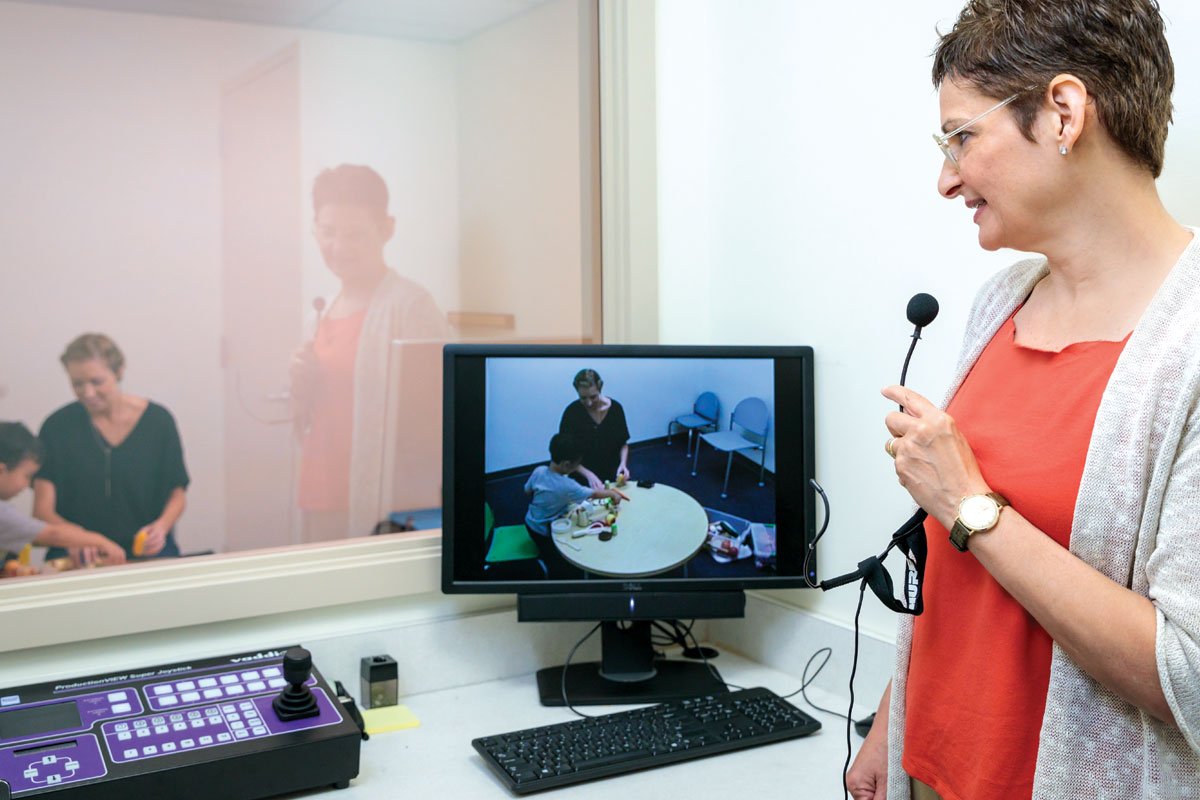
Compelled by the potential to improve the lives of vulnerable children, emeritus trustee Walter Metcalfe and his wife, Cynthia, have committed nearly $4 million through outright and estate gifts to support the work of Joan L. Luby, MD, a highly regarded child psychiatrist.
Luby and her colleagues have linked adversity, including poverty and neglect in the first years of life, to changes in brain anatomy. These changes increase the risk of learning difficulties, clinical depression and behavioral problems that affect a child’s well-being.
Their research also demonstrates that, by contrast, extensive nurturing from parents and supportive early therapeutic intervention can limit, or even eliminate, the impact of adversity on the developing brain.
With support from the Metcalfes, Luby is expanding a project to gauge the effects of environmental stress on brain development and overall health in children by recruiting their mothers while they are still pregnant. Luby will measure stress and adversity experienced during pregnancy and after the children are born. The study, funded by an $11.6 million grant from the National Institute of Mental Health (NIMH), will follow 370 children in the St. Louis area from before birth to age 3.
Luby, the Samuel and Mae S. Ludwig Professor of Child Psychiatry and director of the school’s Early Emotional Development Program, will assess emotional and behavioral development. Meanwhile, co-investigators Christopher D. Smyser, MD, associate professor of neurology, will use MRI to track brain development, while professor of pediatrics Barbara B. Warner, MD, examines the impact of environmental stress on the children’s gut microbiome and immune systems.
The study will include an expanded focus on epigenetics. Described as the interface of nature and nurture, epigenetics investigates the influence of environment on gene expression.

The researchers will collect saliva samples from infants at birth and 12, 24 and 36 months of age to analyze genetic information. They are looking for any changes that might appear throughout the genome and are storing the DNA from the children for further analysis should patterns emerge. The eventual plan is to learn how gene-environment interactions influence brain development and emotional and behavioral health.
Luby’s team has demonstrated poverty’s negative effects on the developing brain. In previous work, the researchers found that a type of interactive therapy that helps parents be more nurturing, and teaches them to enhance their child’s emotional development, can reduce rates of childhood depression and other mental health problems. Although these problems present particular problems for poor children, they also affect children across the income spectrum.
“Dr. Luby’s work on childhood depression has been groundbreaking, including an entirely new strategy for effective therapeutic behavioral intervention,” said David H. Perlmutter, MD, executive vice chancellor for medical affairs, the George and Carol Bauer Dean of the School of Medicine and the Spencer T. and Ann W. Olin Distinguished Professor. “Her continuing efforts to understand the negative effects of poverty and neglect on the young brain, and developing therapies to combat those effects, is critically important and inspirational. We are so fortunate to have the vision of the Metcalfes to invest in and support research like Joan’s that is innovating in this most challenging area of medicine.”
Influencing public health
The new gift is one more way Walter and Cynthia Metcalfe have supported Washington University over the years. “We see this as an investment in Washington University, in St. Louis and, most importantly, in children and their mental health,” said Cynthia Metcalfe.
Walter Metcalfe, like his parents before him, attended Washington University; he earned a bachelor’s degree in history in 1960. Several family members also are alumni, including Cynthia Metcalfe’s father.
“The power of the research is that it could really have an impact on public policy and funding for programs that make a difference early on,” Walter Metcalfe said. “I don’t know of anything that’s more important than helping children lead productive, healthy lives.”
A member of the School of Medicine’s National Council since 2007, Walter Metcalfe is chair emeritus of Bryan Cave Leighton Paisner LLP, an international law firm that doubled in size under his leadership. He has served on Washington University’s Board of Trustees and the Washington University Law National Council. The Metcalfes also are sustaining charter members of the Danforth Circle Chancellor’s Level of the William Greenleaf Eliot Society.
Luby said she is grateful for the Metcalfes’ generosity, which will allow her to immediately build on the existing NIH-funded study and more rapidly influence public health.
“It will give my research team the freedom to explore and innovate in areas with a very high potential public health payoff that would take many years to launch through the typical federal grant system,” Luby said.
Information for this story provided by Jim Dryden, Tricia Hendricks and Channing Suhl.
Published in the Winter 2019-20 issue





 Share
Share Tweet
Tweet Email
Email